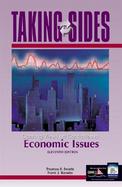Clashing Views on Controversial Economic Issues
- List Price: $23.12
- Binding: Paperback
- Edition: 11
- Publisher: McGraw-Hill College
- Publish date: 08/01/2003
Description:
PART 1. Microeconomic IssuesISSUE 1. Are Profits the Only Business of Business?YES: Milton Friedman, from "The Social Responsibility of Business Is to Increase Its Profits," The New York Times Magazine (September 13, 1970)NO: Robert Almeder, from "Morality in the Marketplace," in Milton Snoeyenbos, Robert Almeder, and James Humber, eds., Business Ethics, rev. ed. (Prometheus Press, 1998)Free-market economist Milton Friedman contends that the sole responsibilityof business is to increase its profits. Philosopher Robert Almeder maintains that ifcapitalism is to survive, it must act in socially responsibleways that go beyond profit making.ISSUE 2. Should Cities Subsidize Sports and Sports Venues?YES: Thomas V. Chema, from "When Professional Sports Justify the Subsidy: A Reply to Robert Baade," The Journal of Urban Affairs (vol. 18, no. 1, 1996)NO: Robert A. Baade, from "Stadium Subsidies Make Little Economic Sense for Cities: A Rejoinder," The Journal of Urban Affairs (vol. 18, no. 1, 1996)Attorney and economic development expert Thomas V. Chemaasserts that a sports venue has bothdirect and indirect returns to invested dollars. Economics professor and urban sports facilitiesconsultant Robert A. Baade argues that although one might justify a sportssubsidy on the basis of "image" or "enhanced quality of life,"one cannot justify spending limited development dollars onthe economic returns that come from sports venues.ISSUE 3. Is There Discrimination in U.S. Labor Markets?YES: William A. Darity, Jr., and Patrick L. Mason, from "Evidence on Discrimination in Employment: Codes of Color, Codes of Gender," Journal of Economic Perspectives (Spring 1998)NO: James J. Heckman, from "Detecting Discrimination," Journal of Economic Perspectives (Spring 1998)Professor of economics William A. Darity, Jr.,and associate professor of economics Patrick L. Mason assert that the lack of progress made since the mid-1970s towardestablishing equality in wages between the races is evidence of persistent discrimination in U.S. labormarkets. Professor of economics James J. Heckman arguesthat markets-driven by the profit motive of employers-willcompete away any wage differentials that are not justified bydifferences in human capital.ISSUE 4. Should California's Electric Utility Industry Be Deregulated?YES: George Reisman, from "California Screaming, Under Government Blows," Ludwig von Mises Institute, (December 22, 2000)NO: Wenonah Hauter and Tyson Slocum, from "It's Greed Stupid! Debunking the Ten Myths of Utility Deregulation," Report of Public Citizen's Critical Mass Energy and Environment Program (January 2001)Professor of economics George Reisman asserts that the root cause of California's power problems is not the "free market" but "destructionist government policy... inspired by environmentalist fanaticism." He goes on to argue that this inappropriate government intrusion "has increasingly restricted the supply of electric power." Wenonah Hauter and Tyson Slocum, director and senior researcher,respectively, of Public Citizen's Critical Mass Energy and EnvironmentProgram, contend that California's attempt to deregulate its electricutilities has failed miserably. They debunk what they consider to be the 10"myths" that proponents of deregulation used to call for the original roundof deregulation in California and are currently using to call for even morederegulation of California's electric power system.ISSUE 5. Should Markets Be Allowed to Solve the Shortage in Body Parts?YES: Charles T. Carlstrom and Christy D. Rollow, from "The Rationing of Transplantable Organs: A Troubled Lineup," The Cato Journal (Fall 1997)NO: Nancy Scheper-Hughes, from "The End of the Body: The Global Traffic in Organs for Transplant Surgery," Organs Watch, (May 14, 1998)Free-market economists Charles T. Carlstrom and Christy D. Rollow argue that the simple use of market incentives can go a long way to solving the shortage o
Expand description
Product notice
Returnable at the third party seller's discretion and may come without consumable supplements like access codes, CD's, or workbooks.
| Seller | Condition | Comments | Price |
|
Wonder Book - Member ABAA/ILAB
|
Very Good |
$4.91
|

Please Wait

